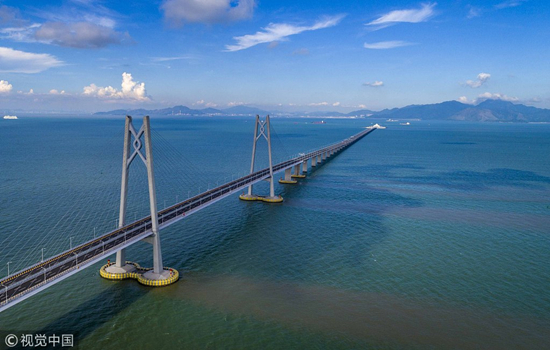Central government to provide further support to HK, Macao, Bay Area

The Hong Kong-Zhuhai-Macao Bridge. [Photo/VCG]
In the Government Work Report Premier Li Keqiang delivered at the NPC session on Tuesday, the central government expressed firm support of the Hong Kong and Macao SARs in seizing the major opportunities by the Belt and Road Initiative and the Guangdong-Hong Kong-Macao Greater Bay Area development strategy.
The central government has every confidence that Hong Kong and Macao will develop and thrive together with the mainland and maintain long-term prosperity and stability, and encourages Hong Kong and Macao to give better play to their strengths, and deepen mutually beneficial cooperation with the Chinese mainland in all fields, according to the report.
The National Development and Reform Commission, setting out the major tasks for economic and social development in 2019, said it will give more support to Hong Kong and Macao in integrating themselves into the overall development of the country, and accelerate the planning and development of the Guangdong-Hong Kong-Macao Greater Bay Area.
Concrete policies and measures will be rolled out to make it easier for Hong Kong and Macao residents to apply for mainland residence permits and to pursue development on the mainland, the NDRC said.
The NDRC said it will draw up plans on industrial development, infrastructure and ecological conservation and environmental protection for the Guangdong-Hong Kong-Macao Grater Bay Area, and support the development of Shenzhen's Qianhai, Guangzhou's Nansha, and Zhuhai's Hengqin as platforms for cooperation between Guangdong, Hong Kong and Macao.
Hong Kong will enjoy further support in its efforts to raise its standing as an international financial, shipping, and trade center, and develop itself as an international center for innovation in science and technology.
Macao will also receive the central government's support in building the city into a world tourism and leisure center, in serving as a platform for business and trade cooperation between China and Lusophone countries, and in building itself as a hub for scientific and industrial development of traditional Chinese medicine, the NDRC added.
All rights reserved. Presented by China Daily









